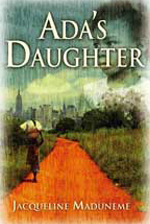
Author – Jacqueline Maduneme
Publisher/ Date – Pointed Arrows (May 2011)
Book Title – Ada’s Daughter (356 pages)
Genre – Memoir (Dysfunctional Families)
Reviewer – Myne Whitman
Source – Review Copy from Author
The memoir is a difficult literary form to pull off, in its insistence that the author plumbs the depths of their psyche to make sense of their lived experience in a way others can tap into. Also, because the writer peels back the curtain, the reader is left no hiding place, and biases come to the fore. It did not help matters that in Ada’s Daughter, Jacqueline Maduneme tackled topics that are often considered taboo in most communities. Issues of child sexual abuse, probable incest, and domestic violence, rape of a minor, familial discord, among other deep and disturbing themes. Written in accessible language that suited her character in the different stages of development, some pages left me with mouth open and heart aching, wondering at how much of the book reflected me, and what it revealed of Nigeria, our beliefs and values as a society.
Jacqueline is the first daughter of an Igbo woman known as Ada, a trained teacher who married a man from a royal family also in Igboland. Her younger brother follows after some years, so it’s surprising that cracks start to appear not long after. The problem is that her father was a borderline alcoholic and a serial womanizer and when he was not abusing Jacqueline’s mother, her father would push the boundaries on how sexual he could get with her. I am still trying to wrap my head around the type of men that would watch someone as an infant, and then feel sexually attracted to them while they are still children. It is even more puzzling when it is an adult bonded to the child by blood and family. It was also painful that other adults, who should have ‘saved’ rallied around Jacqueline, were so apathetic, and sometimes downright offensive.
While I was reading this book, the incident with Mr. and Mrs. Wigwe – the former Nigerian ambassador to Kenya and his wife – hit the tabloids. Domestic violence was also involved in that case, but what I found very interesting was the couple’s history. Why would Mrs. Wigwe return to an estranged husband without resolving their issues? Why would Jacqueline Maduneme’s mother remain in an abusive marriage for so long? I thought on these questions and on the state of being a woman, of most times being the weaker gender, not just physically and emotionally, but also socially. I grieved at the years of socialization that ensures many women will often attack their own to protect perceived interests and positions in society and in their immediate family. Could it be that our society not only shields dysfunction, but actually champions it?
All this introspection meant that much as I was by turns troubled and then furious by the things happening in this memoir, I was never bored. Jacqueline Maduneme was unapologetic in laying bare her good and bad sides, her family, and some parts of the Nigerian society. Through the more detailed recounting of her childhood and going to boarding school, Jacqueline moves on to narrate her relocation to the United States, her failed relationships including one marriage, and how she becomes her own woman. The descriptions took me to 70s Nigeria, filling in some gaps of the decade before I was born, and then I was in Enugu again, and in boarding house in the nineties. Jacqueline does not spare herself in dredging up her memories, and she mentions that she had also discussed with her mother leading up to writing the book.
As I approached the end of Ada’s Daughter, I could almost believe that I had met Jacqueline Maduneme and knew her family. I marveled at how the book spoke to the strength at the core of the author. I imagined the courage it must have taken to confront some memories and relive others, and write it down while never seeking sympathy from the reader. And when I read the author say in more than a couple of places that she loved her father, I had to remind myself how complicated emotions can be in real life. Jacqueline took her painful past and made it a story – funny, depressing, terrible, but all the more inspiring for being factual. The book was especially eye-opening for me as I identified some similarities between my background and that of the author, and it allowed me to study my own psyche and question my assumptions.
There are no literary bells and whistles in this book, but it is well edited with an easily readable style. Those who have been at the butt of sexual abuse may find that Ada’s Daughter brings up painful memories that had been repressed, but maybe speaking out will help them on the journey of finding healing. While some may argue that Jacqueline’s middle-class upbringing subtracts from the book’s impact, I think it is good to know that wealth is no barrier to abuse and dysfunction. And it is past time to start a conversation on these themes that are often swept under the carpet in our society. I believe Jacqueline wrote this memoir with a lot of sensitivity, there is not prettying up the abuse, but neither is it offered up for readers to make salacious mockery of. The most powerful part of this book however, is that at the end of it all, the author has found some sort of healing and acceptance with the people and the circumstances of her past.